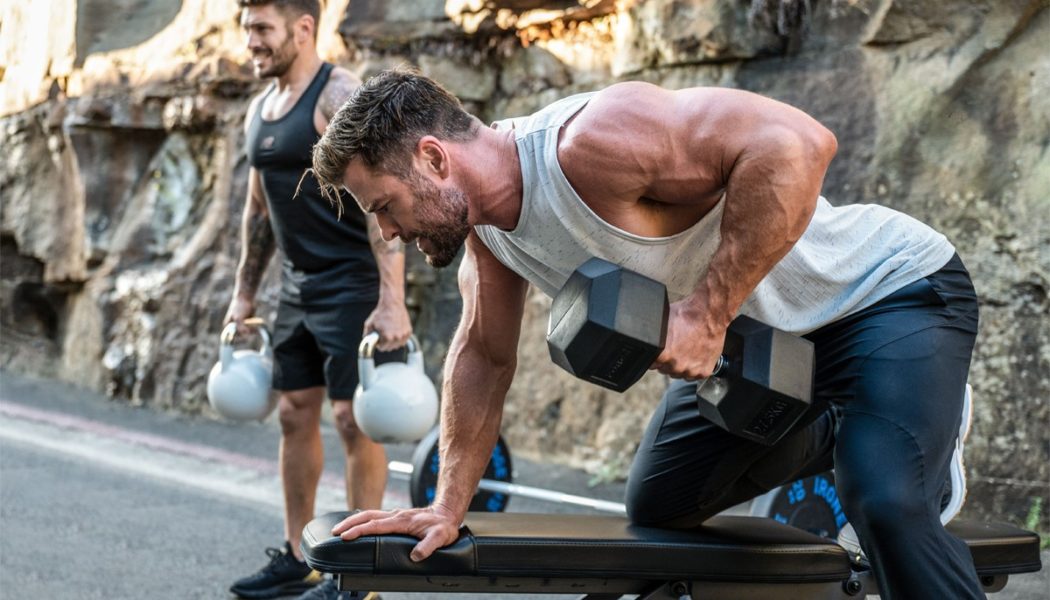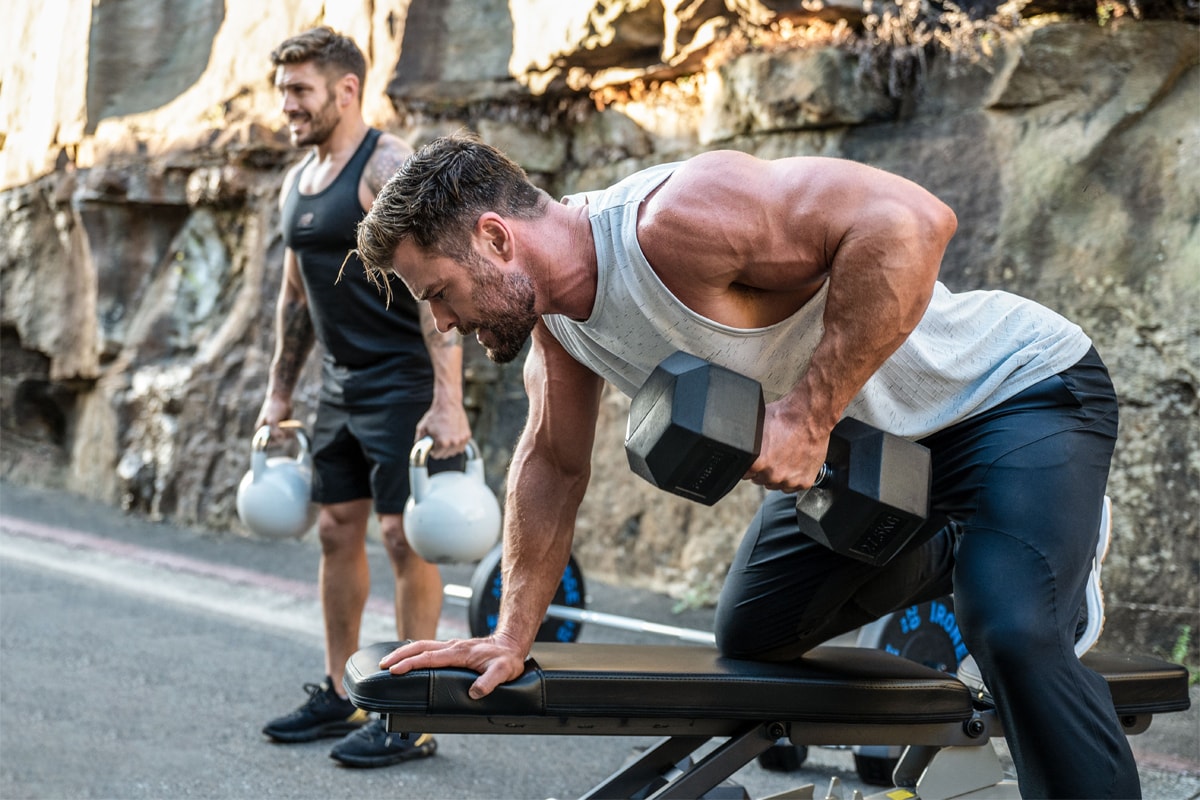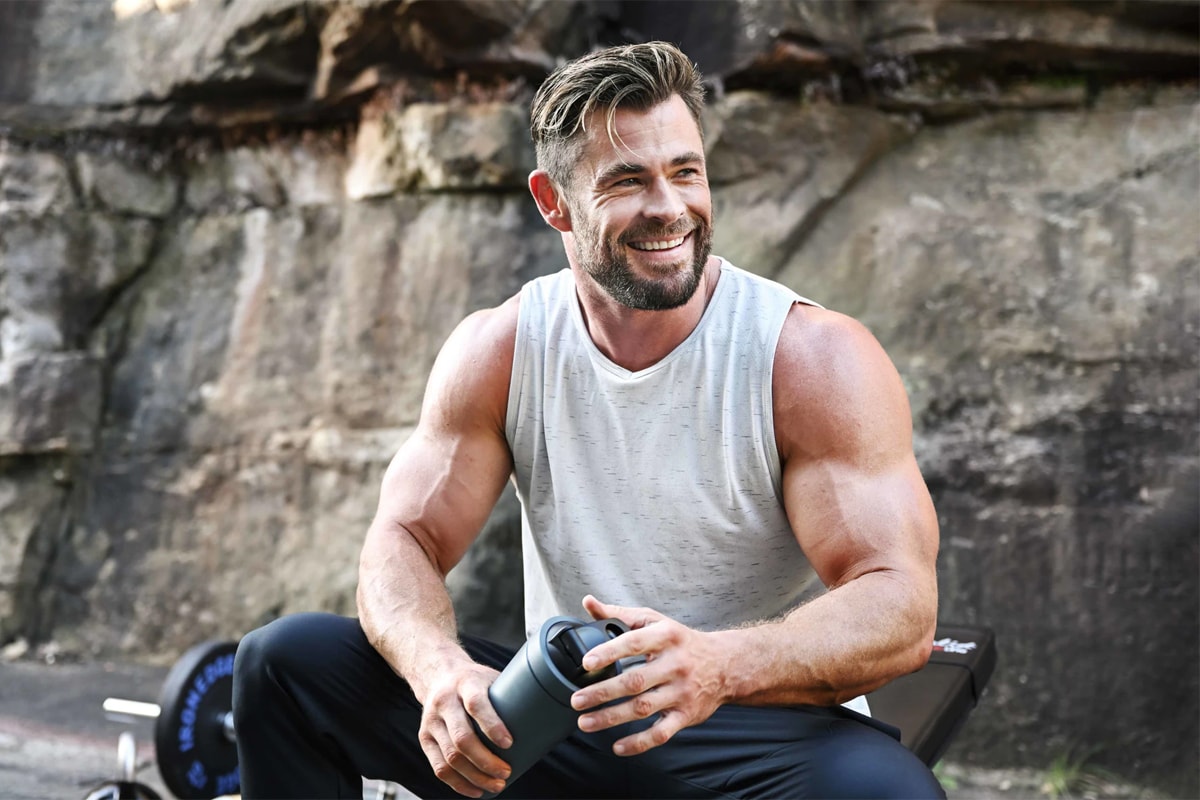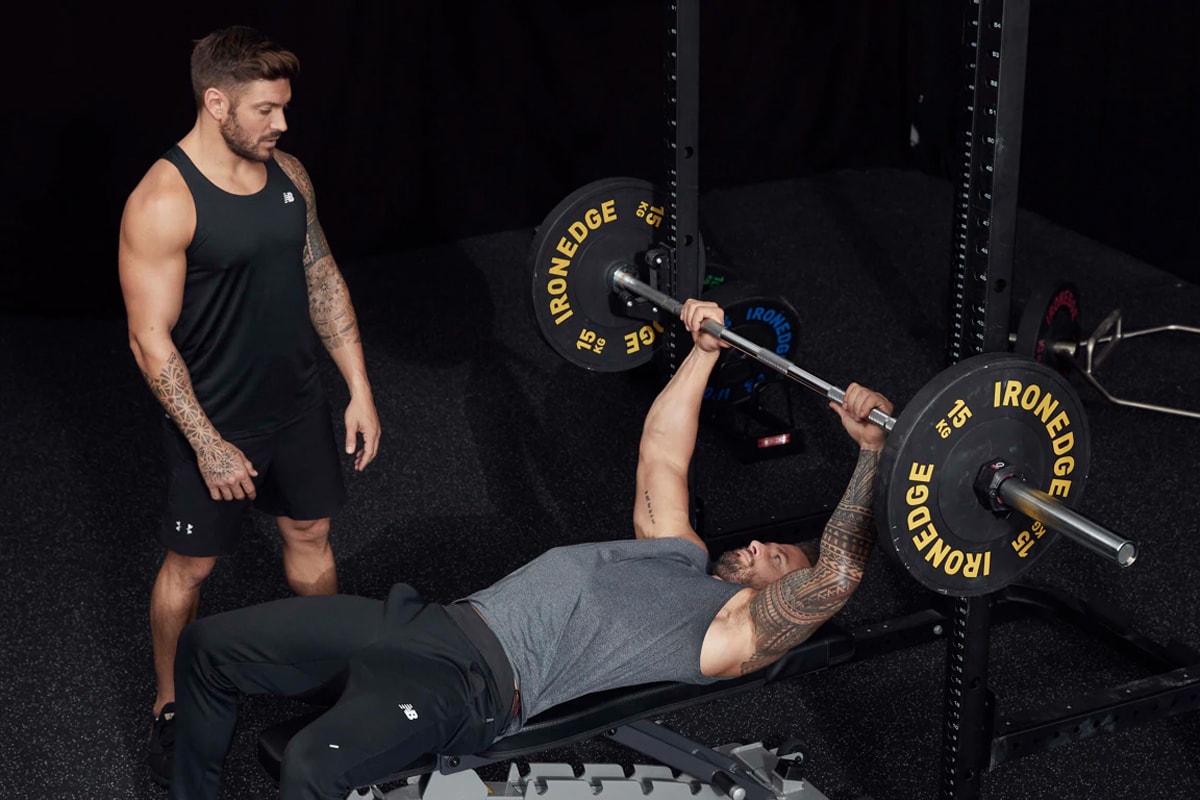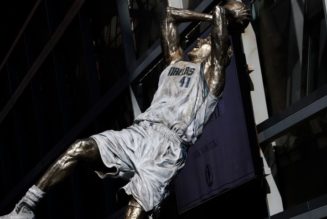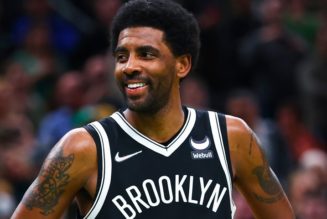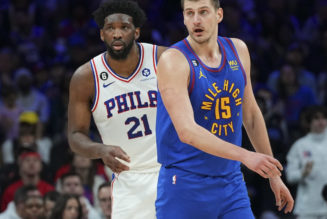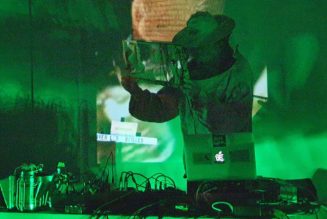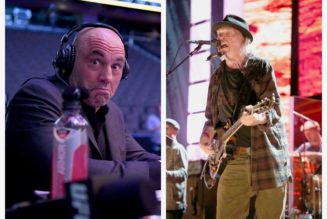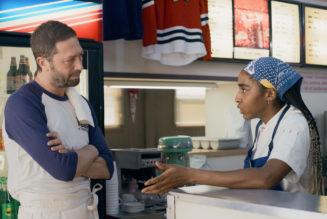Between effortlessly wielding Mjölnir and single-handedly overpowering Thanos, it’s befitting that Thor, aka Chris Hemsworth, possesses the physique that is equal to his worthiness as the Asgardian God of Thunder. Many Marvel fans who also enjoy working out and lifting heavy at the gym have looked up to the Australian actor and his build as an ultimate goal, but for most of us, looking like a Hollywood star seems almost impossible to achieve.
Hemsworth’s childhood friend and personal trainer Luke Zocchi — pictured above on the right of Hemsworth, while on his left is his stunt double — is a fitness expert with roots in boxing, and has joined us at HYPEBEAST to speak about his experience with Thor himself, the training program the two came up with together, and why one should never skip cardio and cooking your own food.
How did you first get to know Chris Hemsworth?
It actually started a very long time ago, Chris and I went to primary school together. I met Chris when I was in second grade and he was one year above me — so I think I was seven, and he was eight years old. And after primary school we did high school together, so I’ve actually known him a really long time.
And how did you become his personal trainer?
We were good buddies, and I used to work in Australia while he was off working in America. He and I would always catch up every Christmas to keep in touch because we’re good friends. At the time he had just finished Thor 2, and we were in Costa Rica on holiday. He was trying to lose weight and slim down again for his next role, so he and I would get up in the morning and go for a run, and since I have a background in boxing I’d do some pad work with him. I think that gave him the idea, and one day he rang me — I think it was around Easter — and asked what I was doing, and if I wanted to help him do a little boot camp to lose some weight — just a six-week boot camp. I agreed and went over there for the six weeks, but ended up going on for the rest of the film with him. I literally have never been home since. We didn’t even have one day off when we flew to London and started the next film, going into Avengers: Age of Ultron. And it’s just been like that. I never went home, I’ve never been back.
You’ve said previously that you tailor his workouts according to the role he’ll be playing. Which role so far has been the hardest one to train for?
Besides bulking all the time for the Marvel films, I think the most challenging for him has been In the Heart of the Sea. I don’t know if many people have seen that film but it’s a Ron Howard film based on the true story of a bunch of guys who claim that a white whale sank their ship and I think it’s where the Moby Dick story came about. Chris had to look like he was starving at sea, so we did a lot of cardio. We actually stopped doing any boxing because the resistance of hitting the pads just kept his arms too muscular. In the end, he was just cycling but the hardest part was the diet. For about a month he was on 500 calories a day with intermittent fasting. He just did not enjoy it at all, going from eating a lot of food and lifting weights, to basically just cycling on a recumbent bike and dieting. He was tired from filming the whole time as well, so that was definitely his most challenging role physically.
You’ve worked with him across something like 13 films now. How is it like training the God of Thunder? How hard does he train?
That’s one thing I must say about Chris’ work ethic: he’s unbelievable. When he gets into a role and has to hustle, work and train, even when he’s working on a script or just in the gym, when it’s time to go to work, he works so hard. He’s got a really good work ethic and pushes himself pretty hard. And with all those Thor roles, part of the work is also backing it up with the food. He’s eating so much that he gets sick of it. He eats every two hours because he’s naturally a taller, skinnier guy, so for him to put on that muscle he needs a lot of calories.
You’ve said before that he eats around six times a day when he’s bulking up for Thor.
On this film (Thor: Love and Thunder) — I’m not joking — he was eating up to eight to 10 times a day. As soon as he went into hair and makeup on set at six o’clock he’d have his first meal, and then 460 calories every two hours. Every third meal he’d just be so over food so I’d bring him a protein shake with a double scoop of protein, banana, almond butter, two dates, and a bit of salt just to give him a break from eating but then we’d start again later.
He’s played Thor in quite a few Marvel films since you’ve joined him. How has his training routine evolved over the years for the role?
It’s definitely evolved a lot because when I first started working with him, he took a quite traditional bodybuilder approach. When we got to Thor: Ragnarok, we tried to do a lot more functional training while keeping his size. That’s one of the biggest things he focuses on because he loves surfing and doing all kinds of active things but when he gets bulky, he finds it really hard to even just do normal things. It’s uncomfortable for him, so yeah, there’s been a lot of progression with functional strength. And I hate to say it but we’re getting a little older so we’re trying to train a bit smarter. There was a time when we felt that more was better and we’d just kill ourselves in the gym, but we can’t do that forever and we definitely respect rest days more now. Obviously when he needs to train hard he will, but we just try to be more mindful and think long-term as well.
How hard is it to achieve the God of Thunder physique for us mortals?
I get this a lot and I always say it’s definitely hard. You’ve got to do a lot of work and I think it’s good to look at Chris and use him almost as a goal for yourself, but don’t beat yourself up if you don’t look exactly like him. I get messages from people on Instagram daily asking me how to get arms like Chris Hemsworth and I’m like, “I do the exact same workouts as him. We’re on the same kind of food. But my arms look nothing like his.” So I think it’s good to have a goal to train towards, but at the same time don’t beat yourself up and still be happy with your own progress. But yes, it is hard, don’t get me wrong. It takes work, but if you stick to a structured plan like Centr Power and with good nutrition and rest, you can definitely get results.
Which brings us to the app you’ve worked on with Chris: Centr. How did the idea first come about to create a fitness app?
It was pretty crazy, because I was in these meetings for two years before Centr even came out. Chris had a meeting with these guys, and I still remember him saying “I want to create the Encyclopedia of health and fitness,” and he thought it’d be pretty cool to have a platform to share all this information that Chris and I have learned along the way. I was a personal trainer, but the amount of stuff I’ve learned just through the access that Chris has to different people has been incredible. We’ve gotten to meet some top CrossFit guys in the U.S. and we’ve trained with Navy SEAL guys too so the amount of knowledge we’ve learnt over the years — I think it’s really cool that he wants to pass it on.
The app’s seen a lot of success since its launch, with a lot of great reviews from different publications and communities online. What separates Centr from other fitness apps out there? I’ve noticed the app takes a very holistic approach to fitness and training.
A lot of people think “Oh, I’m going to get healthy and fit, so I’m going to go kill myself in the gym,” but we go beyond that. With the app, we take a holistic approach that encompasses three main pillars to health and fitness: training, nutrition and mindfulness. I think mindfulness gets overlooked a lot of the time. When the idea of Centr came about, I thought that a lot of people would just think it’s an app for people who want to get jacked and lift weights in the gym, but we’ve really tried to cover everything within health and fitness the way Chris imagined, even things like pilates and yoga. We’ve designed the app for a wider audience, where they might be pushed for time because they’ve got jobs, they’ve got kids, and they just want these cool little 20 to 30-minute workouts that are going to get them results and make them feel good. But we still offer a wide variety of options which is really cool. We’re not just pushing one specific training style or regime.
You’ve recently launched a new 10-week program called Centr Power that you designed with Chris himself. Can you tell us more about it?
Ever since I’ve worked with Chris, people have asked me how to get arms like him. Everyone’s always asked what he actually does for Thor, and Chris has been asked countless times as well, so answering that is what we’ve done with Centr Power. There are three levels in the program: beginner, intermediate and advanced. The advanced workouts on Centr Power are basically 90% of what Chris does for Thor. We change certain variations and bits and pieces, but that is the core of what Chris would do when he’s bulking for Thor. From there we’ve scaled it back and reverse engineered it to create two more levels for those who might not be working at the advanced stage yet.
Most of us lead pretty busy lives nowadays, so packing in a workout might seem overwhelming at times. How much time should we be spending in the gym per day or per week?
I’m a big believer that you can get a good workout in 20 minutes. I try to train for 20 minutes a day, five days a week. For those just beginning, I’d say even just three times a week, 20 minutes each day is a good start. You’ll generally find that when people first get into it they’ll hate it, they’ll be sore and say “Why do people do this? This sucks!” But then they’ll start to like it and maybe step it up to four or five times a week, but for me generally 20 minutes three times a week is a good starting point.
I’ve known a lot of people who first start getting into fitness and say: “How do I know if I’m working out properly? How do I know that I’m progressing? How should I be feeling?” — Do you have any gauges or benchmarks for what makes a good workout?
It’s a good question. I think it depends on what your goal is and what you’re trying to achieve. If it’s just general fitness, you’d want to get your heart rate up and feel like you got to sweat and you’ve worked a bit. If you’re just walking around for 20 minutes, maybe that’s a good start but you’ll want to progress up, eventually start doing some sprints, but it also depends on what level you’re at.
I remember watching videos about Arnold Schwarzenegger and he said he used to work out until he’d throw up every session, which sounds a bit intense for people who aren’t trying to become the next Mr. Olympia.
His level is almost the pinnacle of bodybuilding, so that’s the level he would have to push. For people starting out, a slight walk on an incline hill might be a struggle for 20 minutes, and that would be a good starting point for them. That’s what makes health and fitness so interesting — it’s all down to the individual. It’s a learning curve because you have to see how you feel before you either bring up the intensity or dial it back a little. Even for me, sometimes I’d do 10 minutes on an assault bike and get this sick feeling and I hate it. But yeah, vomiting after exercising isn’t amazing. Everyone has to vomit every now and then, but you don’t have to get results by vomiting, trust me.
Everyone knows the saying “you are what you eat,” and cooking your own meals and controlling what you consume seems to be a big part within the Centr app as well. Just how important is nutrition and dieting?
Your diet is so important. You can do the most hardcore weightlifting in the world, but if you don’t eat enough protein, you’re not going to build muscle. And if you’re in a calorie surplus, where you eat more food than your body burns, you’re still going to put weight on. Dieting and exercising both work together to get you to the goals you’re training for, so I think it’s great to know more about cooking your own food, because then you can control your diet easier. The cool thing about Centr is that we try to simplify recipes, because I know myself, and if I’m on set all day, there’s no way I’m cooking something that takes longer than 20 minutes when I get back. It has to be simple for me to stick to it, and that’s what we try to do. You can still definitely get results by buying all your food, but it would probably be more costly. You just have to find a structure that works for you. For me, I always cook my own dinner and sometimes I’ll try to cook more for dinner and take that the next day too. But overall, it’s definitely important to at least have an understanding of food and learn how to cook a few things.
Is it true that when you are trying to bulk up, you try to avoid cardio? How important is cardio actually?
Cardio is so important, and it does often get overlooked. For Thor: Love and Thunder, Chris told me he wanted to get huge because it could be his last Thor movie, and I decided to get huge with him too, so I said I’m not doing any cardio — and I felt terrible. I was getting bigger but it just didn’t work for me, so I agree that you definitely need to do some cardio. Even with weightlifting, if you just keep doing the same movements like bench presses or bicep curls, you become almost like a robot, only moving in certain ways, which is why in Centr Power on your off days we’re giving you functional movement exercises to do like bear crawls. If you always get into the same movement patterns, it’s just not good for you.
Staying motivated is another massive factor many of us struggle with. What do you do to keep yourself focused and on track?
At this point I feel like it’s just ingrained in me, but for a lot of people, when they start lifting weights and notice a bit of a change to their body, that’s one of the biggest motivators for them. Then it becomes a knock-on effect where they just train more and keep getting better results. For me though, it’s so ingrained that if I don’t train for those 20 minutes a day, I feel flat and sluggish. Of course, I do take rest days, but being active just puts me in a better mindset and headspace.
For those interested in training like Thor, you can learn more about Centr Power over on its website.
